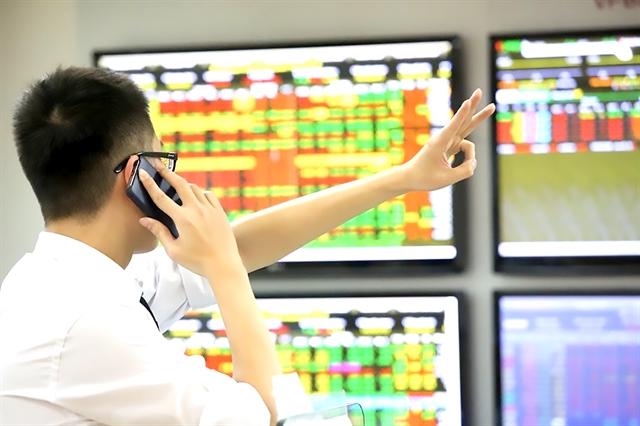 |
| An investor makes a call while watching the market move. Photo: VNA/VNS |
HANOI — There has been notable progress in Vietnam’s stock market valuation, according to a recent MSCI June 2024 report.
The rating agency said the country has demonstrated improved transfer capacity due to increased off-exchange trading and the ability to transfer real assets without needing prior regulatory approval.
However, he added that the domestic market faces certain challenges as it transitions from a frontier to an emerging market.
MSCI classifies markets based on three criteria: economic development, market size and liquidity, and market accessibility to global capital flows.
Vietnam meets our market size and liquidity requirements, outperforming many other emerging markets in the region.
The country’s stock market has a market capitalization of over $200 billion, making it larger than Qatar and the Philippines, and with daily liquidity of $776 million, market liquidity is on par with regional markets such as Indonesia, Malaysia and Singapore.
However, market access for global investors remains a major obstacle for Vietnam’s stock market.
As a result, according to MSCI’s latest report, “Global Market Accessibility Assessment,” Vietnam continues to be classified as a frontier market. Although the transferability criteria have improved, there remain eight key criteria that need to be further strengthened to meet the requirements for market upgrading.
According to a recent analysis by Vietnam Dragon Securities, the main obstacles in Vietnam’s market upgrading process include the opening up to foreign ownership, the ease of international capital movements and the efficiency of market operations, which need to be improved.
To achieve upgrading, a country only needs to strengthen standards on opening up foreign ownership and efficiency of market operations.
The securities firm explained that restrictions on capital movements are considered weaker than the needs of the domestic currency exchange market.
In terms of openness to foreign ownership, Vietnam’s quantitative factors are similar to those of Thailand. However, in terms of qualitative factors based on the investor community’s assessment, the implementation of Thailand’s “Non-Voting Common Shares – NVDR” policy has significantly improved market access standards, leading to an upgrade.
Regarding the efficiency of market operations for foreign investors, the lack of information disclosure constraints, limited English language legal regulations, and the slow adoption of International Financial Reporting Standards (IFRS) are perceived by foreign investors as hindering Vietnam’s compliance with international standards.
Current regulations requiring 100% pre-funding before a purchase order is placed to mitigate the risk of payment default before securities are transferred to investor accounts create a further obstacle to trading for foreign investors.
This practice does not comply with international standards for the Delivery versus Payment (DvP) mechanism, which requires the simultaneous exchange of funds and securities.
To solve the pre-funding issue, Dương Ngọc Tuấn, deputy director general of the Vietnam Securities Depository and Settlement Corporation (VSDC), proposed a solution focusing on foreign institutional investors.
The broker assesses the investor’s capabilities, determines the deposit levels and ensures timely payment. If the investor does not meet the payment requirements, the obligation is transferred to the broker’s proprietary trading block.
But challenges remain in addressing technical issues and raising sufficient capital, and the company is considering restricting trading by market participants to mitigate risks, Tuan said at a conference in mid-April.
He added that securities firms must ensure the execution of transactions of a sufficient size for foreign investors. Moreover, the securities firms’ solvency must be sufficient to meet their obligations even in the worst case scenario.
Post-upgrade considerations
In addition to the objectives and benefits that come from upgrading your market, an important question arises: should you make efforts to keep it upgraded?
In reality, there are cases, such as Argentina, where a country was upgraded but later downgraded because it failed to maintain the necessary conditions.
Vu Tri Dung, head of the international cooperation department at the State Securities Commission, suggested that securities firms need to upgrade their systems to establish online connections with stock exchanges and foreign investors.
The purpose of this enhancement is to improve order execution capabilities. As the market expands and products that increase investors’ capital turnover, such as short selling and day trading, appear, the number of trading orders is likely to increase.
This highlights the importance of brokerages having the capacity to receive and process trade orders efficiently.
Moreover, if the market fails to maintain its attractiveness following the upgrade, there could be a significant risk of a sharp decline as foreign investors withdraw their capital.
According to experts from the Market Development Department of the National Institute of Financial Research, foreign investors’ decision to withdraw capital is influenced not only by domestic market conditions but also by fluctuations in the international market.
However, a significant withdrawal of foreign capital could worsen market sentiment, triggering strong selling pressure and potentially leading to an uncontrolled market decline. — VNS

